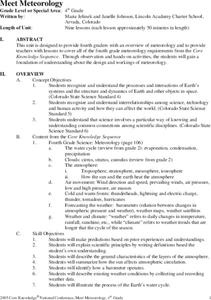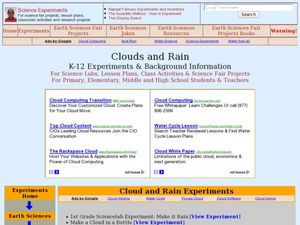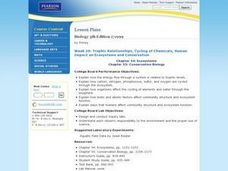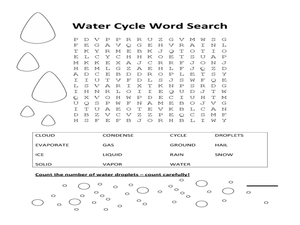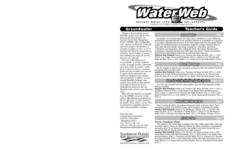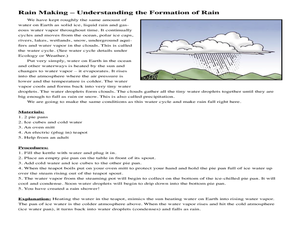Curated OER
How Much Water Does A Tree Transpire In A Day
Students engage in a lesson of investigating the amount of water that is transpired in a one day cycle. They conduct research to find the purpose of transpiration and find information to explain the value to a plant and explain how...
Curated OER
Water 3: Melting and Freezing
Students understand that most substances may exist as solids, liquids, or gases depending on the temperature, pressure, and nature of that substance. This knowledge is critical to understanding that water in our world is constantly...
Curated OER
Talking About Clouds
In this weather worksheet, students read a selection about the water cycle and cloud identification. Then the students fill in the missing words in 5 sentences and write the name of 5 cloud types while describing the clouds.
Curated OER
Definition of Science Terms
In this water vocabulary worksheet, learners read and learn 12 words that pertain to water and the water cycle. Each word and definition is printed on a separate page in a snowflake shape.
Curated OER
Meet Meteorology
Students explore meteorology, discuss Earth's atmosphere, create drawings of the water cycle, create meteorology journals, and role play forecasters. Nine lessons on one page; includes unit test.
Curated OER
Clouds and Rain
Young scholars study how clouds form, what different types there are and what rain is. In this atmospheric lesson students make a cloud and create evaporation.
Curated OER
Rain Machine (Solar Still)
Students experiment with a solar still. In this distillation lesson, students find a simple way to use evaporation to make salty water drinkable.
Curated OER
The Atmosphere and Flight
Young scholars investigate evaporation and condensation, and apply the concepts to understanding cloud formation.
Curated OER
How Do You Dew?
Students examine how the processes of condensation and evaporation occur. They describe the relationship between heat energy, evaporation and condensation of water on Earth. They give examples of the processes of evaporation and...
Curated OER
Physical Changes and States of Matter
Fourth graders identify a physical change as one that results in a change in size, shape, or state of matter. After an initial teacher-led discussion and demonstration, groups of students get together to perform an experiment which...
Curated OER
Trophic Relationships, Cycling of Chemicals, Human Impact on Ecosystems and Conservation
Learners explore how the energy flow through a system is related to trophic levels. They investigate how organisms affect the cycling of elements and water through the biosphere. Students participate in lab activities to observe ways...
Curated OER
Outcomes Science 4
In this outcome science 4 worksheet, students apply scientific knowledge to answer and calculate a variety of questions. Students research the answer to several questions using the websites suggested.
Illinois Department of Natural Resources
Section Two: Why is Biodiversity Important?
Explore soil, genetic traits, natural resources, and pollution in a series of lessons that focus on biodiversity. Kids complete experiments to learn more about the importance of varied genes and organisms in an ecosystem.
Curated OER
Clouds
In this weather activity, students read a detailed information sheet about different kinds of clouds and what weather they bring. Students answer 12 questions
Curated OER
The Great Melting Race
Students show their knowledge by choosing the correct answer about solids, liquids and gases. Students also write short answer responses to questions about experiments they have done.
Curated OER
Meteorology (Condensation)
Second graders define condensation and evaporation. They identify and describe the steps in the water cycle. They ask questions to end the lesson.
Curated OER
WaterWeb 2
In this water worksheet, students answer 10 questions about Florida's water. Students also describe the role of ground water and sinkholes.
Curated OER
Earth Processes
Fourth graders explore and discuss the process of evaporation. They discuss how wet things become dry. Students observe the process of evaporation and they make predictions about the observations they make about evaporation. Students...
Curated OER
Up, Up, and Away
Second graders observe the changes that water has when there is a change in a state of matter. In this lesson they observe the results of applying heat to water with the end result of conversion to a gas.
Curated OER
Rain Making - Understanding the Formation of Rain
Students read and conduct and experiment to learn about rain formation. In this water forms lesson, students read about the formation of rain and its purposes. Students then complete a rain experiment activity.
Curated OER
Melting the Ice: Energy Transfer
Learners study thermal energy and energy transfer to sea ice processes. In this energy transfer instructional activity, students make their own ice cream and discuss energy transfer and thermal energy. Learners view a radiation overhead...
Curated OER
Fresh Water From the Oceans?
Students participate in an activity in which they demonstrate how the evaporations of water from the oceans results in fresh water in the form of rain. They create a saltwater solution in a flask and boil the water until most of the...
Curated OER
Junior Engineering Surface Water
Students experience the effects of pollution and erosion on a model of a watershed and explore ways to change the outcome.
Curated OER
Rivers... for Kids
Learners investigate U.S. geography by exploring it's bodies of water. In this river formation lesson, students identify the reasons rivers are needed in our country by reading assigned text. Learners examine a diagram which explains how...






